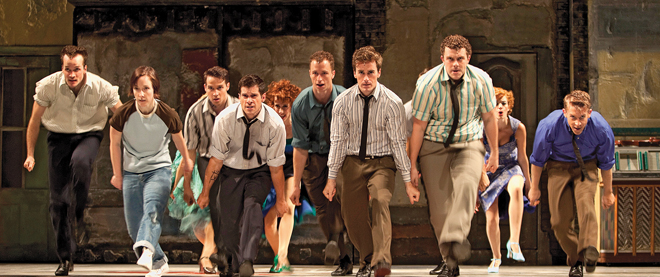What’s next for opera houses? ‘Cats’?
Musicals are making an appearance on opera stages: be careful what you pick.
Photography by Tim Matheson
Share

Opera companies are running out of popular operas to put on the stage. Luckily, there are plenty of popular musicals available to produce instead. Musicals are becoming a bigger part of the operatic repertoire: the Vancouver Opera produced a fully staged version of West Side Story last month, American opera diva Deborah Voigt appeared in a fully staged version of Annie Get Your Gun at the Glimmerglass Opera this past summer, and in early 2012, the Chicago Lyric Opera will present Show Boat. James Wright, general director of the Vancouver Opera, says that opera companies “need to be less rigid than we’ve been in the past.” In some cases, that means putting on a Broadway show instead of another La Bohème.
Leonard Bernstein, the composer of West Side Story, was one of the first to suggest that musicals were the true American opera, and some opera houses have done musicals in previous decades. But the musical temptation has become greater for classically oriented theatres, even overseas: the Théâtre du Châtelet, a house known for operas and operettas, has recently brought material like The Sound of Music to Paris. It helps that these shows sell; West Side Story did well for Vancouver, and Lyric Opera of Chicago general director Anthony Freud says that “when we surveyed our subscribers, almost 70 per cent were very enthusiastic about Show Boat.”
Besides, if a company wants to put on a great work of U.S. music theatre, it may not have much choice but to put on a musical. Except for Gershwin’s Porgy and Bess, which has just been done as a Broadway musical, the 20th century came and went without producing many beloved American operas. Lawrence Johnson of Chicago Classical Review lamented that Show Boat will “accelerate the disappearance of our own operatic heritage.” But there aren’t a lot of North American opera writers who rank with Show Boat’s Jerome Kern and Oscar Hammerstein, either with the public or critics.
It can be hard, though, to define what musicals are appropriate for the opera treatment. Wright says, “Show Boat belongs in an opera house,” but draws the line at Rodgers and Hammerstein shows like Oklahoma! “I love those works, but I don’t think they’re of the same ilk of legitimate composition.” Freud plans to do Oklahoma! in 2013 as part of a summer season, but emphasizes that it will be “in addition to our full opera season,” not a replacement for real operas.
Even when a musical is considered serious and ambitious enough to be part of an opera season, it may not offer a lot of jobs for opera singers. For West Side Story, which is largely a dance show, the Vancouver Opera mostly imported, Wright says, “what we in the business call ‘triple threats’ ”: actors who can also sing and dance, with opera singers only in the two lead roles.
Still, opera companies may have an advantage over repertory and Broadway revivals, which sometimes skimp on musical values. With an opera house, Wright says, “we have a big pit and a big stage. We have our own orchestra.” This can make a difference: Opera News enthused that the Châtelet version of A Little Night Music featured “50 members of the Orchestre Philharmonique,” a huge difference from a then-recent Broadway revival that used only eight players. Some older shows also call for voice types that are more common in opera than in theatre these days; the lead roles of Show Boat require trained voices that can cut through an orchestra, and Freud thinks the impact of hearing that will be “revelatory.”
One thing that still distinguishes musicals from operas is that musicals aren’t reinterpreted and updated the way operas routinely are; Francesca Zambello, the director who did the Glimmerglass Annie and the upcoming Chicago Show Boat, experiments more with operas than she does with musicals. “As long as a work is under certain copyright restrictions,” Wright explains, directors “won’t be able to do much. But when those run out, these works are going to be fair game.” When directors start deconstructing Les Misérables, we’ll know musicals have really arrived in the opera world.